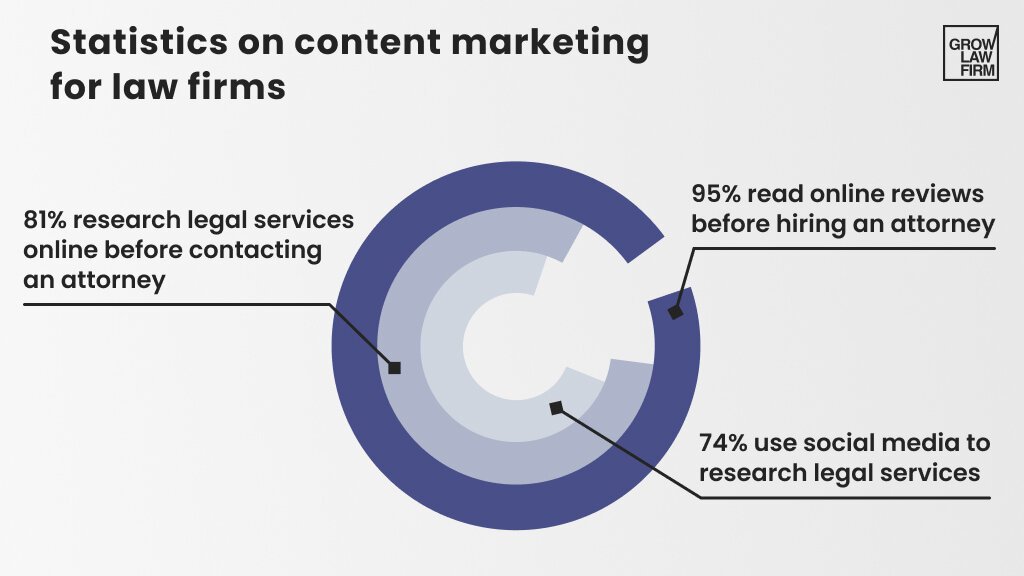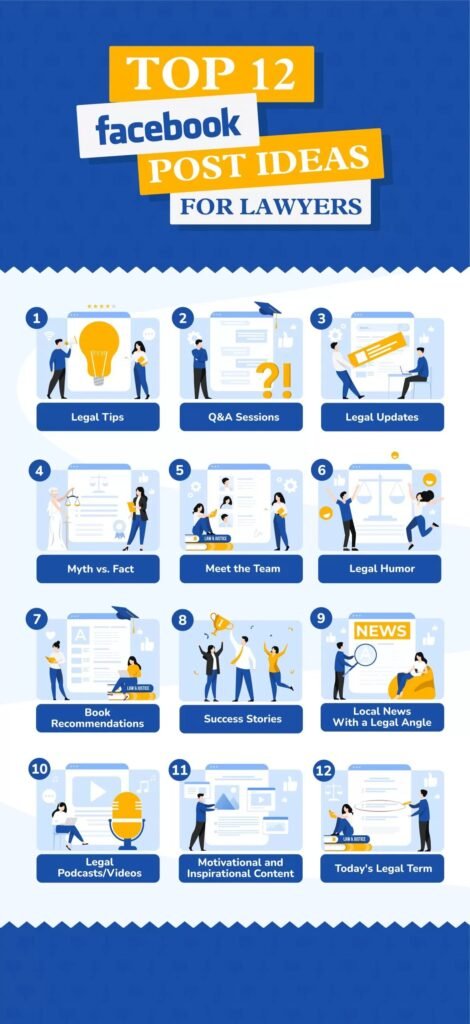
Social Media for Lawyers and Law Firms
Social media has become an essential tool for law firms aiming to build their online presence, connect with potential clients, and establish credibility. Social media for lawyers allows firms to showcase expertise, engage with clients, and reach new audiences in a professional yet approachable way. This guide offers strategies and tips for effectively using social media to enhance your law firm’s digital marketing efforts.
Why Social Media Matters for Lawyers and Law Firms
In today’s digital landscape, social media is an invaluable tool for increasing visibility, credibility, and engagement with potential clients. 96% of lawyers use social media for professional purposes, and 70% of those have reported gaining new clients directly from social media activity (American Bar Association).
- Build Trust and Authority: Sharing legal insights, case studies, and industry news on social media positions your firm as a trusted authority.
- Engagement with Clients: Social media allows firms to respond to inquiries and connect with the community, creating a more approachable image.
- Increased Visibility: Consistent social media presence increases brand recognition and awareness among potential clients and referral sources.
According to GrowLawFirm, consumers are increasingly seeking out law firms with a strong online presence and positive client reviews.

Choosing the Right Social Media Platforms for Law Firms
Selecting the appropriate social media platform is essential for maximizing reach and engagement. Here are the top platforms for law firms:
- LinkedIn: Ideal for B2B engagement, corporate law, and professional networking. LinkedIn allows law firms to publish thought leadership content and connect with peers and potential clients.
- Facebook: Excellent for connecting with a broader audience, building community relationships, and sharing firm updates.
- Instagram: Suitable for firms looking to share visuals and connect with a younger audience. Works well for firms focusing on personal injury, family law, or general legal services.
Tip: Tailor your content for each platform. For example, post in-depth articles on LinkedIn, client testimonials and office events on Facebook, and engaging visuals on Instagram.
Content Ideas for Law Firm Social Media Accounts
The type of content you share on social media significantly impacts engagement and credibility. Here are some effective content ideas:
- Educational Posts: Share legal tips, explain legal concepts, and provide answers to frequently asked questions.
- Client Success Stories: Showcase successful case studies (with client permission) to build trust and demonstrate results.
- Behind-the-Scenes Content: Give followers a glimpse of your office culture, introduce your team members, or share firm achievements.
Example: A personal injury firm could share tips on what to do after an accident or post case outcomes to show expertise in handling personal injury cases.

Effective Content Formats for Lawyers and Law Firms
To attract and engage followers, vary the content formats you use:
- Videos: Create Q&A videos, explain legal processes, or share quick tips. Videos are popular and effective, with 80% of people more likely to engage with video content.
- Infographics: Use infographics to break down complex legal topics in a visually engaging way.
- Articles and Blog Links: Share in-depth articles or blogs that highlight your expertise in specific legal areas.
Tip: A quick, weekly video series answering common legal questions can attract and engage followers consistently.
Building a Content Calendar for Social Media Consistency
Consistency is key for maintaining an active and credible presence on social media. A content calendar helps organize your posts and ensures regular engagement.
- Monthly Calendar: Plan out posts, including content types and platforms, to avoid last-minute rushes.
- Scheduling Tools: Use tools like Hootsuite, Buffer, or native platform schedulers to automate posting and track engagement metrics.
- Engagement Insights: Track the performance of different content types to understand what resonates with your audience.
Example: Schedule educational posts for Mondays, client testimonials for mid-week, and behind-the-scenes content on Fridays.
Leveraging Paid Social Media Advertising for Law Firms
Paid ads on social media allow law firms to target specific audiences and drive high-quality leads:
- Facebook and LinkedIn Ads: Target potential clients based on demographics, location, and interests. These platforms are particularly useful for legal services ads.
- Ad Types: Run ads promoting free consultations, legal Q&A sessions, or community involvement to build brand awareness.
- Results: Paid social ads can quickly generate visibility, helping firms reach new audiences and convert them into clients.
Engaging with Followers and Responding to Comments and Questions
Engagement on social media isn’t just about posting content; it’s also about interacting with your audience:
- Engaging with Comments: Respond to comments and questions in a professional, friendly manner.
- Handling Legal Inquiries: Avoid giving direct legal advice online, but encourage followers to contact your firm for consultations.
- Community Engagement: Show your firm’s involvement in local events, charity work, or legal seminars to foster a sense of community.
The Role of Reviews and Client Testimonials on Social Media
Positive client testimonials and reviews are valuable assets for law firms on social media. 84% of people trust online reviews as much as personal recommendations.
- Requesting Reviews: Encourage satisfied clients to leave reviews on platforms like Facebook and Google.
- Responding to Reviews: Address all reviews, positive or negative, to show that your firm values client feedback and transparency.
Tracking Social Media Performance and Adjusting Strategies
Regularly monitoring your social media performance helps identify what’s working and where adjustments are needed.
- Key Metrics: Track follower growth, engagement rates, and reach.
- Analytics Tools: Use platform insights (e.g., Facebook Insights, LinkedIn Analytics) or tools like Hootsuite to monitor metrics.
- Content Strategy Adjustments: Experiment with different content types and frequencies based on engagement data.
Case Studies of Successful Social Media Strategies for Law Firms
Learning from successful firms can provide actionable insights:
- Real-World Examples: Highlight law firms that effectively use social media to build their brand.
- Takeaways: Discuss the content ideas, engagement tactics, and platform choices that contributed to their success.
- Impact: How their strategies increased visibility, built credibility, and attracted new clients.
Why You Should Hire Our Digital Agency for your Social Media Management
Managing social media and digital marketing can be difficult and time-consuming for busy law firms. Our agency provides comprehensive digital marketing solutions specifically tailored for lawyers and law firms.
We offer an all-in-one package that includes social media management, SEO, website design, content creation, and more. While most agencies charge thousands per month, we offer these services at a fraction of the cost, focusing on quality and affordable solutions. Whether you’re a small firm, startup, or a larger practice with a limited budget, we ensure that every law firm has access to strong online representation. Reach out today, and let’s take your online presence to the next level!
Frequently Asked Questions (FAQs)
Q1: Why should lawyers use social media?
Social media helps lawyers build credibility, reach potential clients, and engage with the community.
Q2: What is the best social media platform for law firms?
LinkedIn, Facebook, and Instagram are the most effective platforms, depending on the audience and practice area.
Q3: Can a law firm handle social media on its own?
Yes, but professional social media management ensures consistency, engagement, and optimization.
Q4: How much time does social media management take?
It varies, but consistent posting, engagement, and tracking require several hours per week.
Q5: How often should a law firm post on social media?
A minimum of 2-3 posts per week is recommended for consistent engagement and visibility.
Q6: Why should I hire a social media agency for my law firm?
An agency brings expertise, consistency, and time savings, helping law firms build an effective and professional online presence